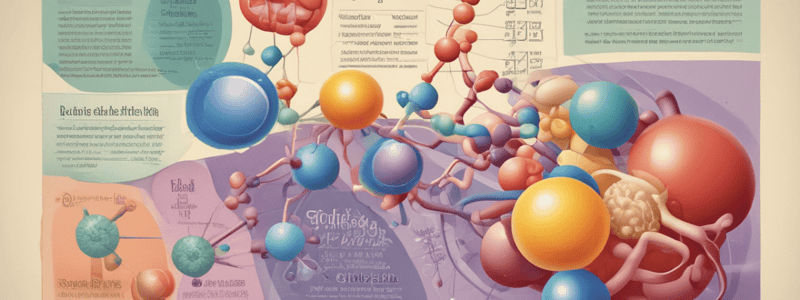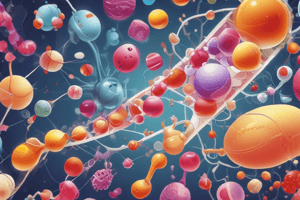Podcast
Questions and Answers
What is the primary function of Vitamin B1 in the body?
What is the primary function of Vitamin B1 in the body?
- To activate iron and folic acid
- To produce hormones by the adrenal glands
- To maintain healthy skin, hair, and eyes
- To help convert carbohydrates into energy (correct)
What are the two biologically active forms of Vitamin B2?
What are the two biologically active forms of Vitamin B2?
- Pyridoxine and Biotin
- FMN and FAD (correct)
- FAD and Niacin
- Riboflavin and Thiamine
Which of the following is NOT a function of Vitamin B2?
Which of the following is NOT a function of Vitamin B2?
- Converting tryptophan into niacin
- Regulating blood pressure (correct)
- Maintaining healthy eyes and nerves
- Producing hormones by the adrenal glands
What is the common deficiency disease caused by a lack of Vitamin B1?
What is the common deficiency disease caused by a lack of Vitamin B1?
Which of the following is NOT a water-soluble vitamin?
Which of the following is NOT a water-soluble vitamin?
What is the role of Vitamin B1 in the nervous system?
What is the role of Vitamin B1 in the nervous system?
What is the function of Flavin Adenine Dinucleotide (FAD) in the body?
What is the function of Flavin Adenine Dinucleotide (FAD) in the body?
Which of the following vitamins is necessary for the absorption of iron?
Which of the following vitamins is necessary for the absorption of iron?
What is the term used for riboflavin deficiency?
What is the term used for riboflavin deficiency?
Which of the following is a symptom of vitamin B2 deficiency?
Which of the following is a symptom of vitamin B2 deficiency?
Which vitamin is a precursor for the coenzymes NAD and NADP?
Which vitamin is a precursor for the coenzymes NAD and NADP?
What condition is caused by a deficiency of niacin?
What condition is caused by a deficiency of niacin?
Which vitamin is involved in the formation of Coenzyme A?
Which vitamin is involved in the formation of Coenzyme A?
What is a common sign of riboflavin deficiency?
What is a common sign of riboflavin deficiency?
Which vitamin helps to convert nutrients into energy?
Which vitamin helps to convert nutrients into energy?
What type of deficiency is very rare among the B vitamins?
What type of deficiency is very rare among the B vitamins?
Which of the following is NOT a symptom of severe vitamin B6 deficiency?
Which of the following is NOT a symptom of severe vitamin B6 deficiency?
What role does folic acid play during pregnancy?
What role does folic acid play during pregnancy?
What is one of the primary functions of vitamin B12?
What is one of the primary functions of vitamin B12?
Which condition is associated with folic acid deficiency?
Which condition is associated with folic acid deficiency?
What is one of the major consequences of vitamin C deficiency?
What is one of the major consequences of vitamin C deficiency?
Which vitamin serves as a precursor for the coenzyme pyridoxal phosphate?
Which vitamin serves as a precursor for the coenzyme pyridoxal phosphate?
Which vitamin is known for its antioxidant properties?
Which vitamin is known for its antioxidant properties?
Which vitamin deficiency can cause neurological problems?
Which vitamin deficiency can cause neurological problems?
Study Notes
Water Soluble Vitamins
Vitamin B Complex
- Composed of: Thiamine (B1), Riboflavin (B2), Niacin (B3), Pantothenic acid (B5), Pyridoxine (B6), Biotin (B7), Folic acid (B9), and Cobalamine (B12)
- All Vitamin B complexes are coenzymes
Energy Releasing Vitamins
- Thiamine (B1)
- Riboflavin (B2)
- Niacin (B3)
- Biotin (B7)
- Pantothenic acid (B5)
Hematobiotic Vitamins
- Folic acid (B9)
- Cobalamine (B12)
Others
- Pyridoxine (B6)
Vitamin B1 (Thiamine)
- Key role in carbohydrate metabolism
- Acts as a coenzyme
- Helps convert carbohydrates, fats, and protein into energy
- Plays a role in the nervous system and good brain function
- Deficiency leads to Beriberi, which can affect the cardiovascular system or central nervous system
- Deficiency symptoms: mental problems, weak muscles, and cardiovascular symptoms
Vitamin B2 (Riboflavin)
- Plays a vital role in maintaining the body's energy supply
- Helps break down proteins, fats, and carbohydrates
- Contributes to the production of ATP
- Biologically active forms: Flavin mononucleotide (FMN) and Flavin adenine dinucleotide (FAD)
- Functions:
- Converting tryptophan into niacin
- Keeping eyes, nerves, muscles, skin, and liver healthy
- Absorbing and activating iron, folic acid, and vitamins B1, B3, and B6
- Hormone production by the adrenal glands
- Deficiency: Ariboflavinosis, characterized by:
- Angular cheilitis
- Inflammation of the lining of the mouth and tongue
- Mouth ulcers
- Sore throat
- Iron-deficiency anemia
Vitamin B3 (Niacin)
- Forms: Nicotinic acid and nicotinamide
- Can be synthesized in the body from tryptophan
- Functions:
- Precursor for coenzymes NAD and NADP in oxidation-reduction reactions
- Converts nutrients into energy, creates cholesterol and fats, and exerts antioxidant effects
- Deficiency: Pellagra, characterized by:
- Dark, scaly rash on skin exposed to sunlight
- Bright redness of the tongue
- Constipation/diarrhea
Vitamin B5 (Pantothenic acid)
- Part of Coenzyme A, essential for energy metabolism
- Helps produce ATP from carbohydrate, protein, and fat breakdown
- Functions:
- Helps produce antibody
- Helps in the production of cortisol
- Formation of Acetylcholine and epinephrine
- Deficiency: Rare, but can cause numbness and burning of hands and feet, headache, extreme tiredness, and gastrointestinal symptoms
Vitamin B6
- Acts as a precursor for coenzyme pyridoxal phosphate (PLP)
- Important in amino acid and glycogen metabolism
- Supports immune function and brain health
- Used as an anti-emetic drug
- Deficiency: Impaired immune function and neurological symptoms
Vitamin B9 (Folic acid)
- Essential for one-carbon metabolism and biosynthesis of several compounds
- Need increases during pregnancy and cell multiplication
- Function: Essential for the production of DNA and RNA
- Deficiency: Megaloblastic anemia and neural tube defects
Vitamin B12 (Cobalamin)
- Important for maintaining healthy nerve cells
- Helps in the production of DNA and RNA
- Works closely with vitamin B9 to help make red blood cells and iron function
- Deficiency: Pernicious anemia and neurological problems
Vitamin C (Ascorbic acid)
- Active form: Ascorbic acid
- Humans cannot synthesize vitamin C and must obtain it from an external supply
- Function:
- Synthesis of collagen, the principal tissue protein
- Acts as an antioxidant
- Deficiency: Scurvy, characterized by skin changes, bleeding gums, tooth loss, fragile blood capillaries, and bone fracture
Studying That Suits You
Use AI to generate personalized quizzes and flashcards to suit your learning preferences.
Related Documents
Description
This quiz covers the classification and functions of water soluble vitamins, including Vitamin B complex and Vitamin C. It's a part of clinical chemistry lectures by Dr. Wael Sobhy Darwish.




